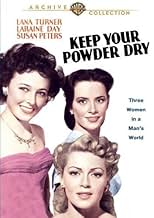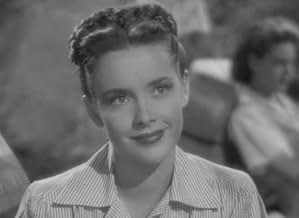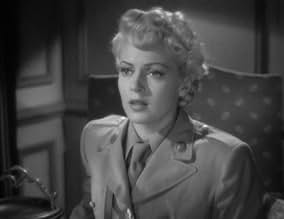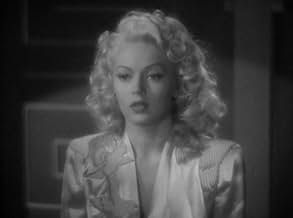A disparate group of women try to adjust to their new lives after enlisting in the Women's Army Corps.A disparate group of women try to adjust to their new lives after enlisting in the Women's Army Corps.A disparate group of women try to adjust to their new lives after enlisting in the Women's Army Corps.
- Director
- Writers
- All cast & crew
- Production, box office & more at IMDbPro
Featured reviews
Loaded with lovely classic Lana WWII scenarios.
I wonder how many young women went off to join the W.A.C. thinking Sydney Guilaroff would be doing their hair and Irene (I) their uniform wardrobe.
We look at films like this as objects through which we can watch a moment in Hollywood time. Lana is simply delightful.
I watch a film like this just for a glimpse of wartime America through the eyes of jaded and spoiled Hollywood elites who are piping this 'dream' to a still highly naïve wartime America.
Watch for Mercury Theatre's -- also the character of Endora on Bewitched (1964)] -- Agnes Moorehead. I reckon that some would say that this glimpse of Moorehead is as fun as that of Lana Turner.
I wonder how many young women went off to join the W.A.C. thinking Sydney Guilaroff would be doing their hair and Irene (I) their uniform wardrobe.
We look at films like this as objects through which we can watch a moment in Hollywood time. Lana is simply delightful.
I watch a film like this just for a glimpse of wartime America through the eyes of jaded and spoiled Hollywood elites who are piping this 'dream' to a still highly naïve wartime America.
Watch for Mercury Theatre's -- also the character of Endora on Bewitched (1964)] -- Agnes Moorehead. I reckon that some would say that this glimpse of Moorehead is as fun as that of Lana Turner.
The unlikely prospect of anyone who looks like Lana Turner giving up her comfy civilian life to wear an army uniform is the hardest thing to swallow about this service film about three women from different walks of life who learn to become army buddies. Turner, of course, is given the glamour treatment and must have made hundreds of girls think they would look terrific in khaki.
Nevertheless, it's an enjoyable enough item sparked by some very competent performances by the mostly female cast. It's the feminine prototype of countless serviceman films produced during the war years of World War II, given non-serious treatment with a story centering on three new WAC recruits. Laraine Day plays an army brat, a girl who constantly flaunts her superiority over the other recruits and for most of the film engages in a tug of war with Turner. While Turner was given the full glamour treatment, Laraine Day succeeded in playing her unsympathetic role to the hilt, for the first time showing a harder edge to her screen personality. The film is enjoyable fluff, with good work by Susan Peters and Agnes Moorehead.
My article on Laraine Day appears in the Spring 2001 issue of FILMS OF THE GOLDEN AGE--and one on Lana Turner is due for publication at a later date.
Nevertheless, it's an enjoyable enough item sparked by some very competent performances by the mostly female cast. It's the feminine prototype of countless serviceman films produced during the war years of World War II, given non-serious treatment with a story centering on three new WAC recruits. Laraine Day plays an army brat, a girl who constantly flaunts her superiority over the other recruits and for most of the film engages in a tug of war with Turner. While Turner was given the full glamour treatment, Laraine Day succeeded in playing her unsympathetic role to the hilt, for the first time showing a harder edge to her screen personality. The film is enjoyable fluff, with good work by Susan Peters and Agnes Moorehead.
My article on Laraine Day appears in the Spring 2001 issue of FILMS OF THE GOLDEN AGE--and one on Lana Turner is due for publication at a later date.
Socialite Valerie Parks (Lana Turner) has trouble accessing her trust fund. She is informed that she should join the Women's Army Corps (WAC) to show her maturity in exercising responsibility. Other ladies are joining for different reasons. Leigh Rand (Laraine Day) is honoring her military general father. Housewife Ann Darrison (Susan Peters) is following her husband who is deploying overseas. Lt. Col. Spottiswoode (Agnes Moorehead) is their commander.
It takes awhile before there is some drama. I do like the drama and the idea of these women trying to change who they are. It's one of the basic selling point of the military. The young people go in with issues and they come out having figured it out. It's "An Officer and a Gentleman". This does come with some over-acting from that era. The ending is a little abrupt. Ann has her tragedy but it's almost forgotten with the other two's story. I like this even without the real war influence.
It takes awhile before there is some drama. I do like the drama and the idea of these women trying to change who they are. It's one of the basic selling point of the military. The young people go in with issues and they come out having figured it out. It's "An Officer and a Gentleman". This does come with some over-acting from that era. The ending is a little abrupt. Ann has her tragedy but it's almost forgotten with the other two's story. I like this even without the real war influence.
-- but Natalie Schafer plays a wealthy, mindless socialite!
If the ending doesn't draw at least a couple tears from your eye, especially these days, then you're heartless. Bah.
If you like this sort of movie (as do I), you will definitely enjoy this particular example of it. Very well done.
My only regret is that they didn't show enough of the training. Having gone through OCS myself, it's such an overwhelming, life-changing experience (though I don't know about the WACs' OCS) that it was a bit of a cheat that we didn't get to see how it changed the girls, only that it did. I suspect the writer was more concerned about the dynamic between the three main characters, rather than the interaction between each of them and the demands of officer candidate school.
Dafydd ab Hugh
If the ending doesn't draw at least a couple tears from your eye, especially these days, then you're heartless. Bah.
If you like this sort of movie (as do I), you will definitely enjoy this particular example of it. Very well done.
My only regret is that they didn't show enough of the training. Having gone through OCS myself, it's such an overwhelming, life-changing experience (though I don't know about the WACs' OCS) that it was a bit of a cheat that we didn't get to see how it changed the girls, only that it did. I suspect the writer was more concerned about the dynamic between the three main characters, rather than the interaction between each of them and the demands of officer candidate school.
Dafydd ab Hugh
It seems that the film boards made a concerted effort to boost the image of women as tough and capable leading up to and continuing through World War II. "Keep Your Powder Dry" is an effort to display three women who overcome their disparate backgrounds, their petty differences, and their civilian prejudices to achieve a greater good by contributing to the war effort. A character in the film puts it this way, "...subordinate your personal feelings for the good of the corps."
This is a consistent theme in movies throughout this era. In John Ford's "Pearl Harbor" a German mocks the notion that the weak and decadent American women could take the place of men in industry to free them for service as soldiers. In "Cry Havoc" we witness the courage, trials, and sacrifices of women on Corregidor. Here in "Keep Your Powder Dry" we learn of the candidates' perseverance through the trials of boot camp, motor pool training, and OCS school (though the examples that they show are weak).
It is a little difficult to suspend reality far enough to buy the notion that Lana Turner could become dedicated to life in the WACs, having arrived by way of Park Avenue, but an effort is made by the screenwriter to show her recognition of the shallow and narcissistic lifestyle that she found there. It occurs rather late in the film, however.
Still, for WWII movie buffs, and fans for the movies of the forties, this one is a must see.
This is a consistent theme in movies throughout this era. In John Ford's "Pearl Harbor" a German mocks the notion that the weak and decadent American women could take the place of men in industry to free them for service as soldiers. In "Cry Havoc" we witness the courage, trials, and sacrifices of women on Corregidor. Here in "Keep Your Powder Dry" we learn of the candidates' perseverance through the trials of boot camp, motor pool training, and OCS school (though the examples that they show are weak).
It is a little difficult to suspend reality far enough to buy the notion that Lana Turner could become dedicated to life in the WACs, having arrived by way of Park Avenue, but an effort is made by the screenwriter to show her recognition of the shallow and narcissistic lifestyle that she found there. It occurs rather late in the film, however.
Still, for WWII movie buffs, and fans for the movies of the forties, this one is a must see.
Did you know
- TriviaLana Turner wrote in her 1982 autobiography that during pre-production she received a studio memo of reprimand about missing many of her wardrobe appointments--even though it was Irene who was not showing up. When Turner went to studio head Louis B. Mayer to defend herself, she was told that the memo was a face-saving device for Irene, who was an alcoholic but so valuable to MGM that the studio was willing to bear with her problems and delays.
- GoofsWhen the WACs are on a long march with cadence, they are marching six abreast. The camera pans closer to them, and they are now four abreast.
- Quotes
Lt. Col. Spottiswoode: I'm sorry for you Rand, you've worked so hard to learn so many things so badly.
- ConnectionsReferenced in Lou Grant: Hollywood (1979)
- SoundtracksYou're In The Army Now
(1917) (uncredited)
Music by Isham Jones
Lyrics by Tell Taylor and Ole Olsen
Played during the opening credits
- How long is Keep Your Powder Dry?Powered by Alexa
Details
- Release date
- Country of origin
- Language
- Also known as
- There Were Three of Us
- Filming locations
- Production company
- See more company credits at IMDbPro
Box office
- Budget
- $1,348,000 (estimated)
- Runtime
- 1h 33m(93 min)
- Color
- Aspect ratio
- 1.37 : 1
Contribute to this page
Suggest an edit or add missing content





































